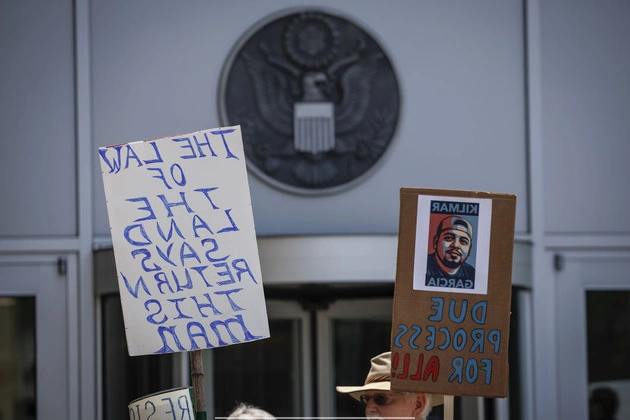
Kilmar Abrego Garcia, a Salvadoran man facing human trafficking charges, is seeking release from custody pending trial. His lawyers argue that the Trump administration’s attempts to keep him in jail violate his due process rights.
Abrego Garcia’s lawyers, four appointed public defenders, filed a 20-page motion with a federal magistrate judge in Nashville, Tennessee, where he was indicted last month. They request the court to grant him the due process he has been denied for several months.
U.S. Magistrate Judge Sarah Holmes is set to hold a hearing on Friday to determine whether Abrego Garcia should remain detained. However, even if he is not detained in the criminal case, he may still be held in immigration custody.
The defense argues that the charges against Abrego Garcia do not warrant pretrial detention in most cases. Prosecutors allege that he was involved in transporting undocumented immigrants and was stopped by the Tennessee Highway Patrol with nine individuals in his vehicle.
Abrego Garcia currently faces federal charges for transporting undocumented immigrants and conspiracy. Prosecutors claim he is a member of the MS-13 gang and engaged in various illegal activities, including alleged involvement in a murder and solicitation of child pornography.
In their filing, Abrego Garcia’s lawyers challenge the government’s legal arguments but do not address specific factual claims against him. They assert that he is not a danger to the public and is willing to face the charges.
Abrego Garcia entered the U.S. in 2012 and sought asylum in 2019, which was denied. Despite an order preventing his deportation to El Salvador due to safety concerns, he was deported in March under the Trump administration’s enforcement actions.
His lawyers highlight the administration’s errors in deporting him and the subsequent challenges in securing his return. They emphasize the need for his release and suggest a stronger case against deportation after the criminal proceedings.
The case reflects broader issues of immigration enforcement and due process rights, underscoring the complexities of legal battles in such circumstances.











